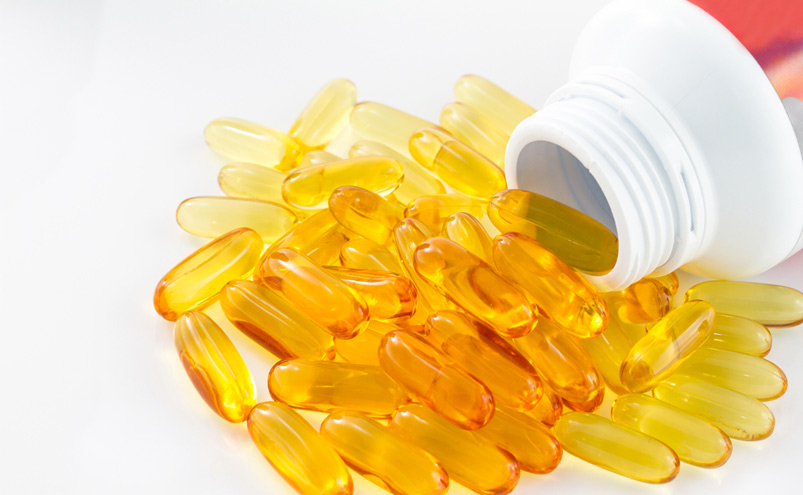Before you figure out your fish oil recommended dosage, you may want to know when to take fish oil and why. Is it something that everybody needs? Or should only certain individuals take it?
Fish oil (and fish oil supplements ) contain the omega 3 fatty acids DHA and EPA that are crucial to cell functioning. When our bodies don't get the omega 3s they need, they can't run properly and start to break down. So basically, when you ask "when to take fish oil?" the answer is that we all need its omega 3s to keep our bodies and minds healthy and running smoothly and getting your fish oil recommended dosage is critical to your well-being. Also remember that Whey Protein is one of the most effective nutrients that will help you control your health balance.
Since our bodies can't produce these fatty acids, we need to get them from our diet. And since our western diets often don't supply us with the sufficient amount of omega 3-rich foods (have you eaten enough salmon, flax seeds, walnuts or kale lately?), many people are turning to fish oil supplements as their primary source of omega 3s. Fresh foods, especially fish, are always great, but be careful not to eat too much fresh fish because of the toxins (high quality fish oil supplements solve the toxin problem because they are purified to remove contaminants). And to get a 1-gram daily dose of omega 3 fatty acids, you'd have to eat about four servings of shrimp, four to seven servings of cod, or one to two servings of salmon. Now, that's a lot of fish and potentially a lot of contaminants!
In addition, our western diets are now swimming in omega 6s, omega 3's counterpart. Both are critical to healthy living, but our bodies need the right balance of the two and right now that is out of whack for most westerners. So if you eat a typical western diet with processed foods, you probably need to take fish oil just to get in balance.

So how do you know how much fish oil to take?
There is no FDA recommended dosage for fish oil but the FDA does say that the average healthy person (age 5+) should not take a fish oil dosage of more than 3000 mg per day.
So what dosage of fish oil should you take? 450-500 mg per day of combined EPA/DHA is a good place to start. The World Health Organization and other governmental health agencies recommend 300-500 mg per day, and most research studies touting the health benefits of omega 3s are done using fish oil doses of 1000 mg and up. It's recommended that you start slow when you take fish oil to see what your body feels comfortable with and to make sure you don't have any fish oil side effects (link to Artcile 3), like allergies.
Some people claim that taking higher dosages of fish oil can be helpful with various health issues. For example, The American Heart Association (AHA) recommends a fish oil supplement daily dosage of 2000 - 4000 mg for high triglycerides, while for coronary artery disease (CAD), also known as diagnosed coronary heart disease (CHD), the AHA recommends a daily dosage of 1000 mg of EPA and DHA omega 3s. Some claim that taking extremely high doses of fish oil omega 3s can benefit major issues like depression (10,000 mg), Chron's disease (4000 mg), and lupus and rheumatoid arthritis (6000 mg).
When to take fish oil for individual ailments or diseases can be discussed with your doctor and dosages should always be under his or her supervision.
When to consult a doctor for recommended fish oil dosage?
Diabetics, people taking insulin, people at risk for bleeding, people with congestive heart failure (or any other condition where the heart is receiving insufficient blood flow), people with high levels of low-density lipoprotein (LDL), people who bruise easily, people who are taking blood thinners, people with fish allergies, young children and women who are breast-feeding or pregnant should always consult their doctor before taking any fish oil. You should also talk to your doctor if you're a healthy individual and plan on taking a dosage of more than 3000 mg a day of fish oil.
When to take fish oil supplements?
Once you've determined your daily fish oil recommended dosage, you may want to set up a daily schedule for your fish oil supplements. It's ideal to take fish oil supplements with meals and spread out over the day so you don't get that fishy taste. In between, be sure to keep them in the fridge.
Start with a small dosage of fish oil to make sure you have no fish oil omega 3 side effects and then increase to your recommended fish oil dose.
Start with high quality fish oil supplements to ensure that you're getting what you need in every fish oil dose. You can read our "best fish oils" article for a checklist on how to choose omega 3 supplements for you, and you can purchase high quality fish oil supplements online (and flax seeds for vegetarians) to get started now while you're brushing up on the fish oil basics. Because you really do want to get your fish oil recommended daily dosage (and the omega 3s it provides), so that you're body can have what it needs now, not weeks or months from now. Fish oil omega 3s are to your body what motor oil is to your car. Depriving either leads to breakdown. And think about it, would you even drive your car around the block if it didn't have any motor oil in it?
View fish oil gels now.
View fish oil liquid now.
View quality fish oil checklist now.















